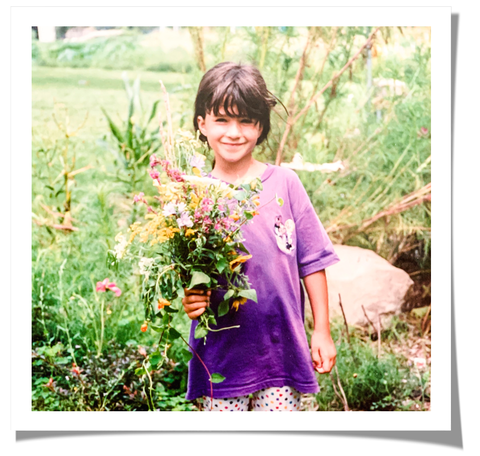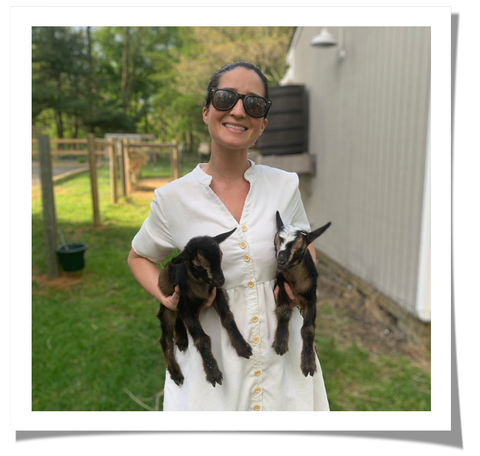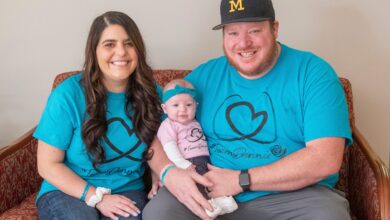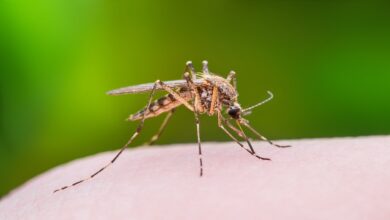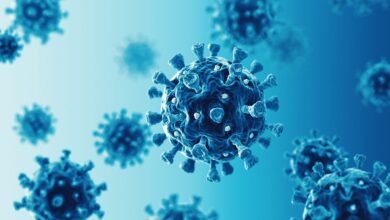Ally Dwyer on How Owning a Homestead Changed Her Health
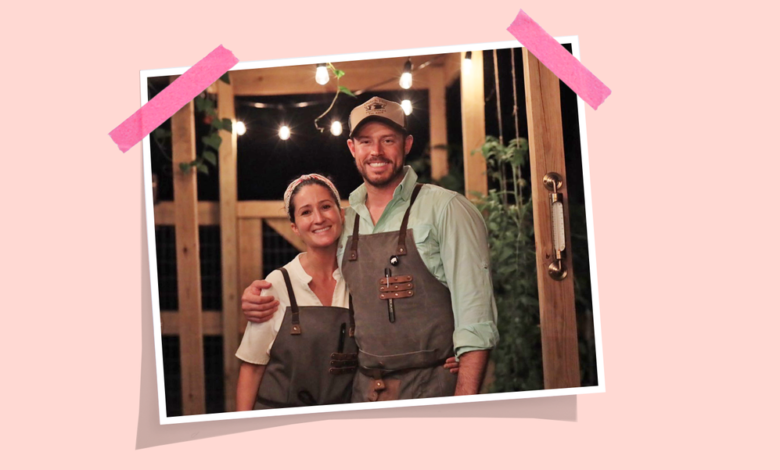
At 6 a.m. Monday through Friday you could usually find me on the ferry with dozens of other people heading off to work. It was so long ago, but whenever I remember commuting from New Jersey to my job on Wall Street, my stomach sinks. It’s as if my body is reliving a time where my external world and my internal desires were at such odds, that my insides couldn’t cope.
Literally.
I was in so much pain and I felt so bloated. Mind you, this wasn’t your everyday seasickness. By the time I got to work, had gone to the bathroom more times than I’m comfortable admitting. At some point I knew I had to get checked out. After a bunch of screenings and tests, the doctor told me I had something that could plague me for the rest of my life: irritable bowel syndrome, or IBS as it’s commonly known.
It’s a disorder that wreaks havoc on the large intestine and causes abdominal pain, gas, diarrhea, constipation and other things I’d rather not describe. As the doctor continued to explain my diagnosis, I was sad to hear that experts didn’t yet understand what causes it, and that meant there was no known cure. I’d have to manage it, he said. Keep the symptoms at bay.
For some people, IBS can be managed by avoiding certain foods. Like my doc told me, I might want to avoid things like gluten, milk, oranges and soda. He also suggested I try this medication that has helped their patients, but I was worried about some of the side effects. Overall, the one thing he emphasized was taking a good hard look at the stress in my life because stress could be a huge IBS trigger.
And I knew he was right. But part of me didn’t think I could afford to do what what my gut was explicitly telling me to do.
I had spent years working hard at building what I thought was a life of security and comfort. I didn’t grow up in what felt like a stable household. Although my parents loved and cared for me the best way they knew how, there were many times when I didn’t feel safe or stable, especially after my parents got divorced. I was an anxious kid who had frequent stomachaches, headaches and often bit my nails until they bled. I thought my way out of all of that was to go to school, get a good corporate job and earn enough where I could create my own home that felt secure.
By my late 20s, I was getting there: I was a successful event planner for a major bank in New York City and making decent money. Even though most of my hours were at the office, I was traveling across the country, going to all of these exciting parties, meeting all sorts of interesting people, driving in private cars and eating fancy food. I was living with a man I loved in a cozy apartment outside the city. I had so much to be grateful for.
But my body had been speaking to me for a long time — telling me something was out of alignment even before the IBS. As much as I tried to endure it, I couldn’t handle staring at Excel spreadsheets and emails all day. I didn’t always want to go out at night to be present at another event or be overwhelmed at a crowded bar. I knew some of my coworkers didn’t mind the job. In fact, they really loved it.
But it wasn’t working for me. All of it was stressing me out to the point my skin started breaking out in hives. I felt tired all of the time and the headaches were coming back and I began biting my nails again just like when I was a kid. I drank more caffeine and alcohol to cope, which ironically didn’t help the anxiety or my health. It was a vicious cycle.
Stress, by the way, just makes any condition you’re dealing with worse: it can increase your blood pressure, alcohol misuse, risk of heart disease, anxiety levels, as well as trigger sadness and depression. Perhaps, my best strategy at the time for managing my stress was taking short walks to the local city park to get some fresh air.
One day, I was sitting in my cubicle texting my mom about how sick I felt.
“You really have NDD,” she said. “You know, nature deficit disorder.”
“Haha, what? Is that real?” I said thinking that she was joking. My mother is more new age than I am and is always saying “out there” stuff that’s a bit woo-woo for me.
But later on, I was talking to some of my friends and I discovered that it’s kind of, sort of a thing. NDD is a popular term that has been used to describe the stress that accumulates from city living. It is not in fact an actual disorder or anything that a person could be diagnosed with, but I felt that my mom was on to something. So, I did some research and discovered that there’s a whole field of study on this topic.
I read studies that found that people who spent at least 120 minutes in nature experienced better overall health and well-being; other research revealed that being exposed regularly to nutrient dense soil can increase the diversity of good bacteria in our microbiome to keep our guts healthy; and there’s a ton of literature on how the gardening can help lower stress and improve mood.
But what was more powerful than all the numbers and stats were some of my happiest childhood memories that resurfaced during my mother’s text convo. I remembered one summer when my parents planted a vegetable garden that I loved. Oftentimes when I got into fights with my siblings, I would pack my bag and tent and move out to the garden for the night.
I remembered another time my mom drove us upstate and we went on this hike through the woods. The sky was so blue and there were so many flowers. I just remember collecting them as my mother told me their names. This was shortly after my parents separated and for the first time in a while that I didn’t feel like that anxious girl anymore. I sat on a rock next my mom in the warm sun and I remember being at peace, thinking, “Everything was going to be okay.”
In remembering all that, I finally came to terms with the fact that no 15-minute walk during my lunch break was going to replace the immersion in nature that has always felt the most authentic to me. I finally decided to lean into what I’ve intuitively known all along.
Even though the idea of dropping the 9-to-5 regular paycheck made me incredibly nervous, I knew I had to leave the city and the security I created there in order for me to heal. My then-boyfriend (now-husband), Rob, and I decided it was time to take a risk and do what we’d been fantasizing about for a long time: Buy a house in the middle of nowhere and live off the earth as much as we could — a privilege and opportunity we know many do not have. We didn’t fully know how exactly we were going to make a living, but we hoped somehow that we would make it work.
In February of that year, we drove out to Marlboro, NJ, and found a tiny two-bedroom 1860s farmhouse for sale. The moment we pulled into its long dirt road I knew it was where I wanted to be.
It was magical for me. You know, like when Snow White starts singing and all the animated animals gather around? There was no corny music, but there were so many real deer walking among these huge, old trees. Beautiful red cardinals were everywhere sitting up in the branches. And when we walked inside, the whole house smelled like warm bread. It was intoxicating. The owner had just finished baking before we arrived.
Standing in that house, I finally felt that feeling again — that “everything was going to be all right” feeling. To think I’d never felt it before in any other place I’d lived.
My heart swelled when they magically said yes to our offer. We moved in in May. Then on my 30th birthday, Rob surprised me with a Nigerian dwarf goat — our first animal out of many more to come. We named her Magnolia and thus our beautiful homestead began.
From then on, our goal was to grow our own whole foods and be more active outdoors. Since Rob and I both had health conditions (he has type 1 diabetes), we thought this was the best way we could support our bodies in feeling better.
Fantasies aside: During the first few months, learning how to source most of our food from our little farm was tough. Rob, who is an engineer, read books and watched a lot of YouTube videos to learn how to hunt, fish, butcher and process our proteins. Through research and trial and error, I honed my gardening skills, learned to pickle, preserve food, milk the goats and figured out how to treat a sneezing chicken (among many other things). It would take days to stock up our kitchen — slower at first because I still had to go to my job in Manhattan to pay the bills. I was still stressed. But spending 30 minutes feeding the chickens in the morning before I hit the road gave me space to breathe and find my energy.
After a few weeks of eating more whole foods and spending more time in the dirt, I noticed that my skin improved and my headaches lessened. But honestly, the IBS didn’t really calm down until I finally got the courage to quit my job so I could spend more time in nature, away from the urban grind. I was lucky when someone offered me an event planning job that I could do from home and eventually leverage to expand my own event planning company. I also needed it so I could continue to build the homestead with Rob without going broke. Taking care of chickens is expensive; it’s much cheaper to run and grab a carton of eggs at the store.
Months later, when Rob and I started inviting our friends and family over for meals, my sister had great idea: to open up the homestead to others and turn it into a business. Ten months after we bought the house, we began with hosting supper clubs where we taught people how to make the food we were eating: homemade tortillas, kombucha cocktails, cheese, you name it. Dutch Hill Homestead turned into a center for all sorts of culinary events, workshops on sustainable living and meditations.
Now with the global pandemic and town zoning regulations, we no longer host. Instead, we share our farm life through social media and sell mushroom broth, soap, cheese, breed animals and all sorts of other things. But sometimes I still think about all of the people who have come to our small home in Jersey to eat, laugh and share. I think about those gatherings and I want to cry because I really feel like I’m finally aligned with what I’m meant to do — that I have created a space where everyone, including myself, can feel welcomed and safe. It’s a home where I can grow, serve others, most importantly serve my family and the planet.
Although my health has improved for the better, I still have IBS and I think I’ll always live with some anxiety. (Some experts say that anxiety is genetic and can only really be managed, not cured.) But now when I have a flare up, I’m not as judgmental of myself. I see my anxiety and IBS as notification systems that get triggered when I’m not living my truth, when I’m people pleasing, eating foods that my body dislikes, or jumping back into that old rat-race mentality. Sometimes flare ups are calls for when I need more support.
I recognize what Rob and I did was extreme and not doable (or desirable) for everyone. Thankfully, there are many, many other nourishing ways to engage with nature that don’t involve raising dwarf goats: spending a few hours at your local park, going on camping trips, short day trips to the beach, regular picnics in the park, even ferry rides for fun (seriously!).
And Rob and I hope that through Dutch Hill Homestead that we can share what we’ve learned with others so that we all can figure out how live more sustainably together as a community. My wish is that more and more people, particularly our leaders, re-prioritize caring for Mother Earth so we can all reconnect to ourselves, to each other and be able to heal.
Editor’s note: If you are suffering from or think you’re suffering from IBS, it’s crucial to speak to your doctor as medication may be beneficial for you. For more info on anxiety and how to manage it, please visit the Anxiety and Depression Association of America.
This content is created and maintained by a third party, and imported onto this page to help users provide their email addresses. You may be able to find more information about this and similar content at piano.io
Source link


